In the Kitchen with the Paudin Universal Collection.
This is a situation where things work well enough. The knives are sharp. They will cut what you need in the kitchen, but the geometry is a little weird, which means difficulty increases exponentially as foods get trickier to cut.
But they’re lightweight with a nice blade-centric balance that gets you close to cutting in a Japanese style, kind of. More than anything, this set is a decent looking bundle that gets you more than what you need in the kitchen and looks nicer than your average budget option.
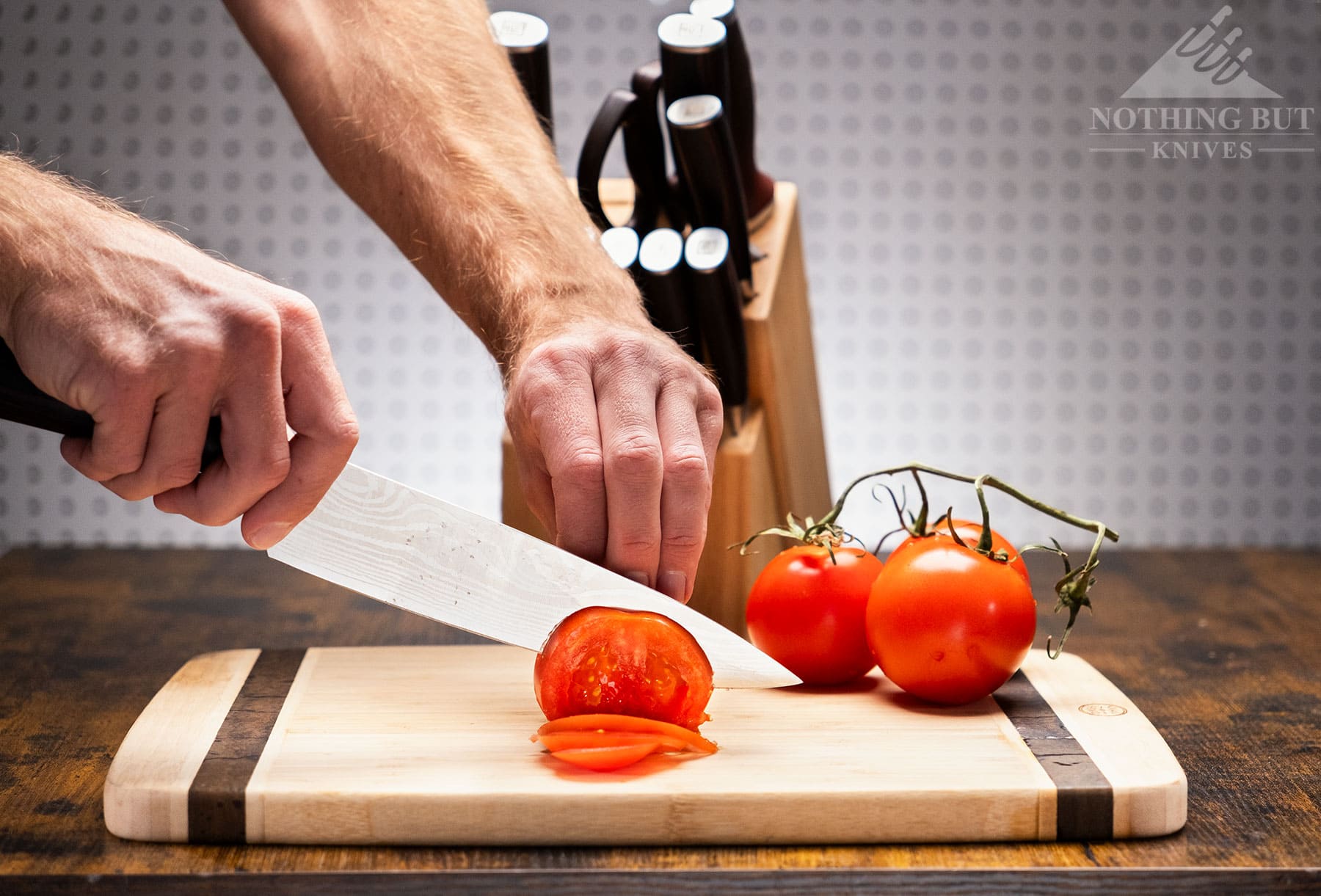
Key Takeaways
- This is a lightweight set with a nice handle design;
- The spines will bite if you like a pinch grip;
- The edge grinds aren’t great or consistent, but they’re functional;
- The serrated blades aren’t too bad. The bread knife is a perk of the set.
Specifications
| Blade Steel: | 5Cr15MoV |
| Steel Hardness: | 56+ HRc |
| Handle: | Pakkawood |
| Construction: | Stick tang |
| Block Dimensions: | 5”W, 8.5” D, 8.5”T |
| Made in: | China |
In This Set
| 8” chef’s knife |
| 8” carving knife |
| 8” bread knife |
| 5” utility knife |
| 3.5” paring knife |
| 4.5” steak knives (6) |
| Kitchen shear |
| 8” honing rod |
Pros & Cons
| What I Liked | What I Didn’t Like |
|---|---|
| Lightweight knives | Sloppy edge grinding overall |
| Great bread knife | Harsh spines |
| Comfortable handle shape |
Fit, Finish, and General Ergos
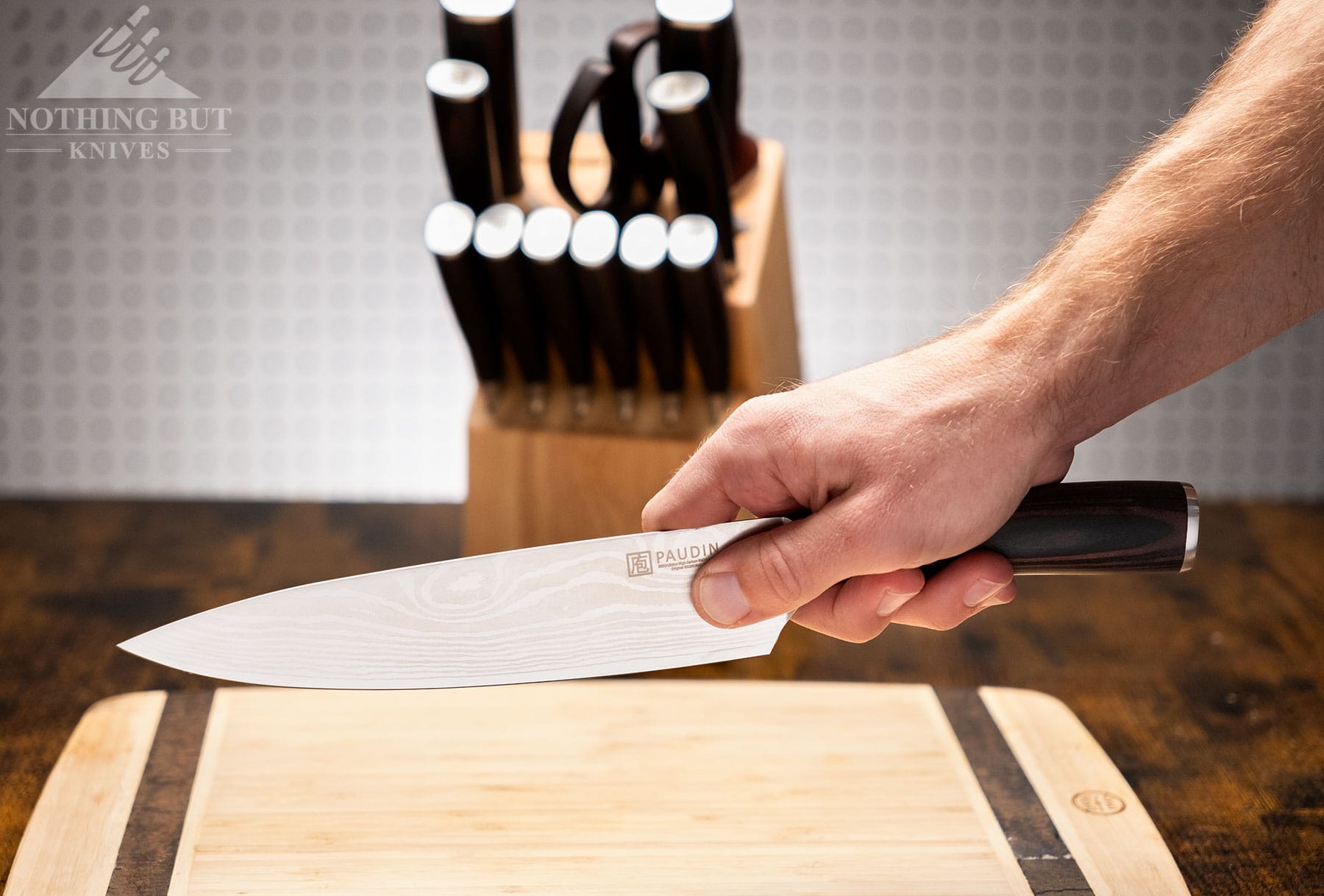
These are lightweight knives that are reasonably comfortable, but the spines are sharp (it doesn’t feel like the blades were tumbled at all) so some grips get kind of hostile when I use these knives for a long time.
The Pakkawood handles have been done well, though. The transitions between wood and bolster and pommel cap are almost completely seamless, and the oval shape is a good ergonomically neutral choice. The handles are probably the best thing overall to be said about the set.
The edge grinds on most of these knives aren’t great. They’re a little uneven, and a lot of them have beards at the heel. That can get frustrating when I’m cutting larger things that really test the full length of an edge because it stops me up short and I have to adjust my angle. More than that, though, it will add a little more hassle to sharpening the knives down the road.
The Steel: Very Standard and Not Damascus
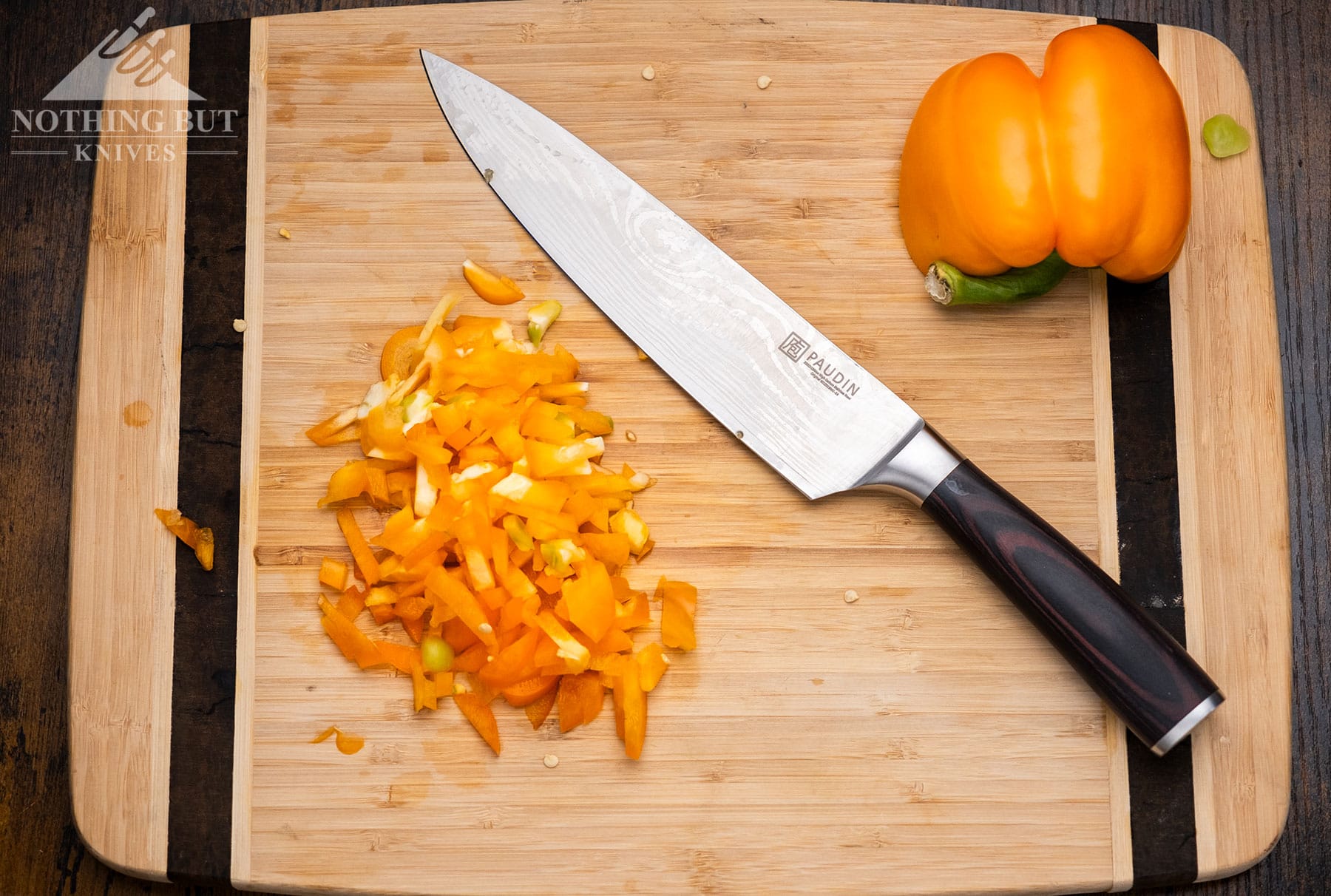
The Damascus pattern is etched. These blades are full pieces of 5Cr15MoV steel (basically the same thing as X50CrMoV15, which is the steel of choice for basically all German kitchen knives, good and bad).
That’s honestly preferable to me in this price range. Damascus done cheaply can be much worse than a cheap monosteel blade, and they seem to have treated this stuff well enough that they kept an edge as long as I needed for each day of cooking.
Keep a strop handy, and make sure you hone the edges of your most used knife, and you’ll get by alright.
The Knives
I won’t break down every single knife. Frankly, not all knives in this set warrant that much attention. They cut, I ate, end of story. But a few had some quirks and surprises that might be worth knowing abou.
Chef’s Knife
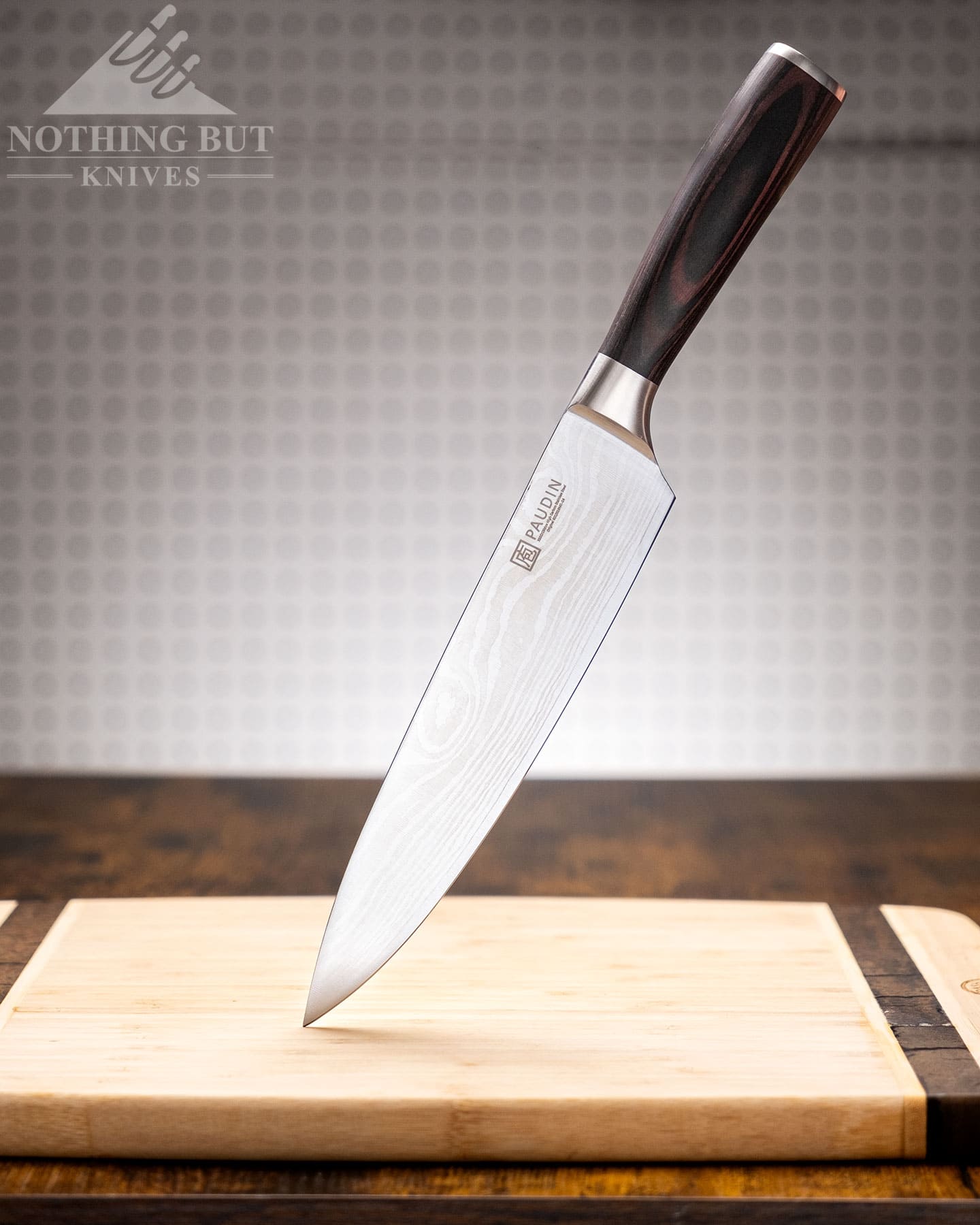
It’s thin and lightweight and has a neutral balance. The edges are thin and have a viscous geometry with a hard bite. Cuts feel aggressive and easy even on softer foods like tomatoes.
But I still had some trouble with it.
It feels blocky when cutting potatoes, and there’s a horrible case of food stick. Worse than I’ve ever experienced before. It was like the potato slices had octopus suckers once they got onto the side of the blade.
It also had trouble finishing cuts. Even starting cuts felt sketchy sometimes because I felt the edge slip, and the harsh spine does not help the case.
So, yes the edge geometry is technically thin. But apparently it’s thin in the wrong way.
It works okay in a draw motion mostly using the tip of the blade. There is thinness here you can take advantage of once you find the right motion, but it might take a little bit of time.
Bread Knife
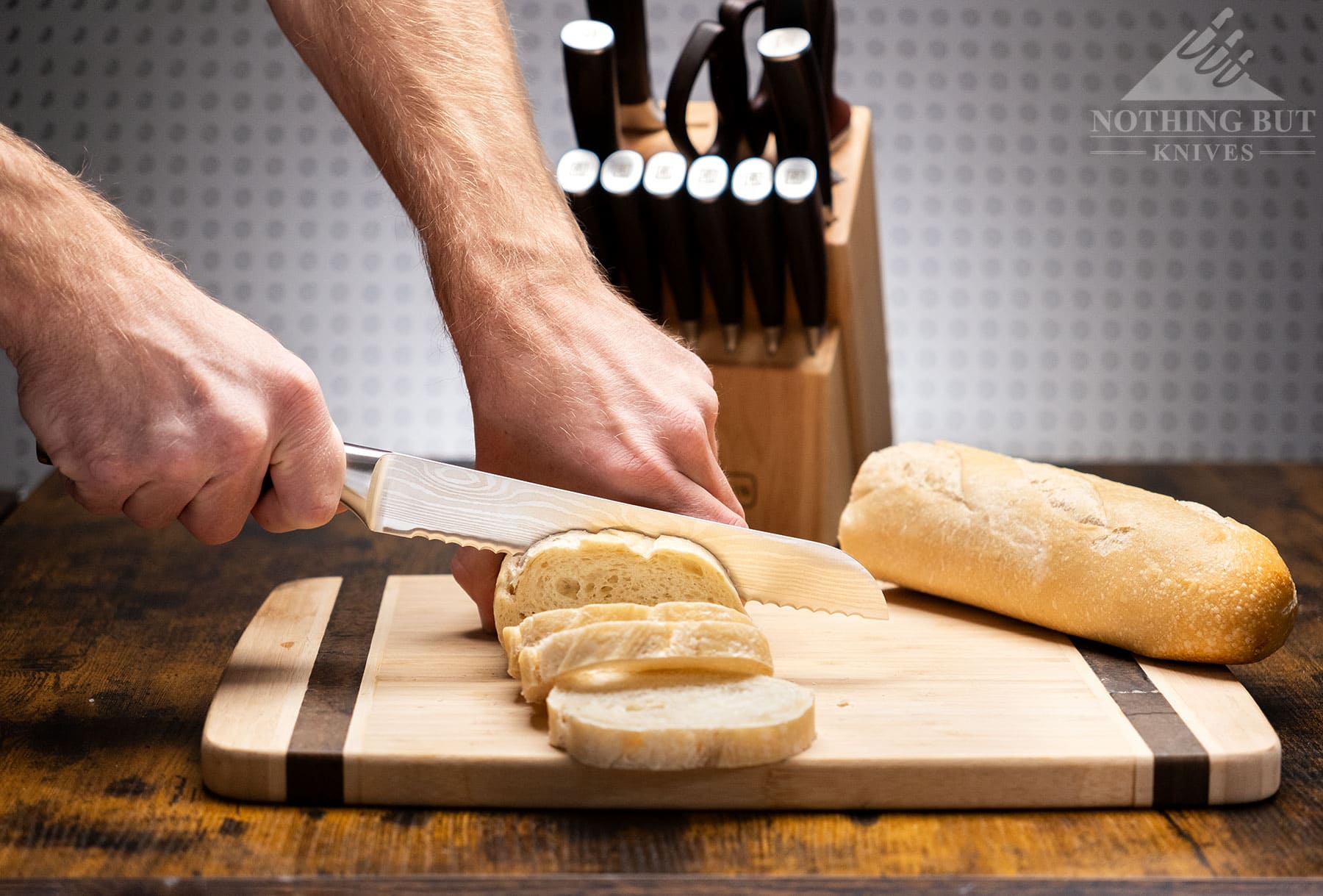
I was surprised how much I liked the bread knife. The serrations feel aggressive but they’re actually fairly shallow so there is a certain cutting action at play along with the typical tearing of serrations.
One change I’d like to see is in the length, though. The blade itself is 8 inches, which might be okay, except the serrations only go to 7 inches, and that’s just not enough to be comfortable cutting a 5-inch-wide load, frankly.
The Slicer
This actually has a little bit of flex to it which could make it a viable boning knife. Not a great one. The blade is a little too tall, but there’s a possibility of versatility down the road. Beyond that, I like the way this cuts better than the chef knife, but that’s probably because I mostly cut fruit and cooked meat with it.
Paring Knife
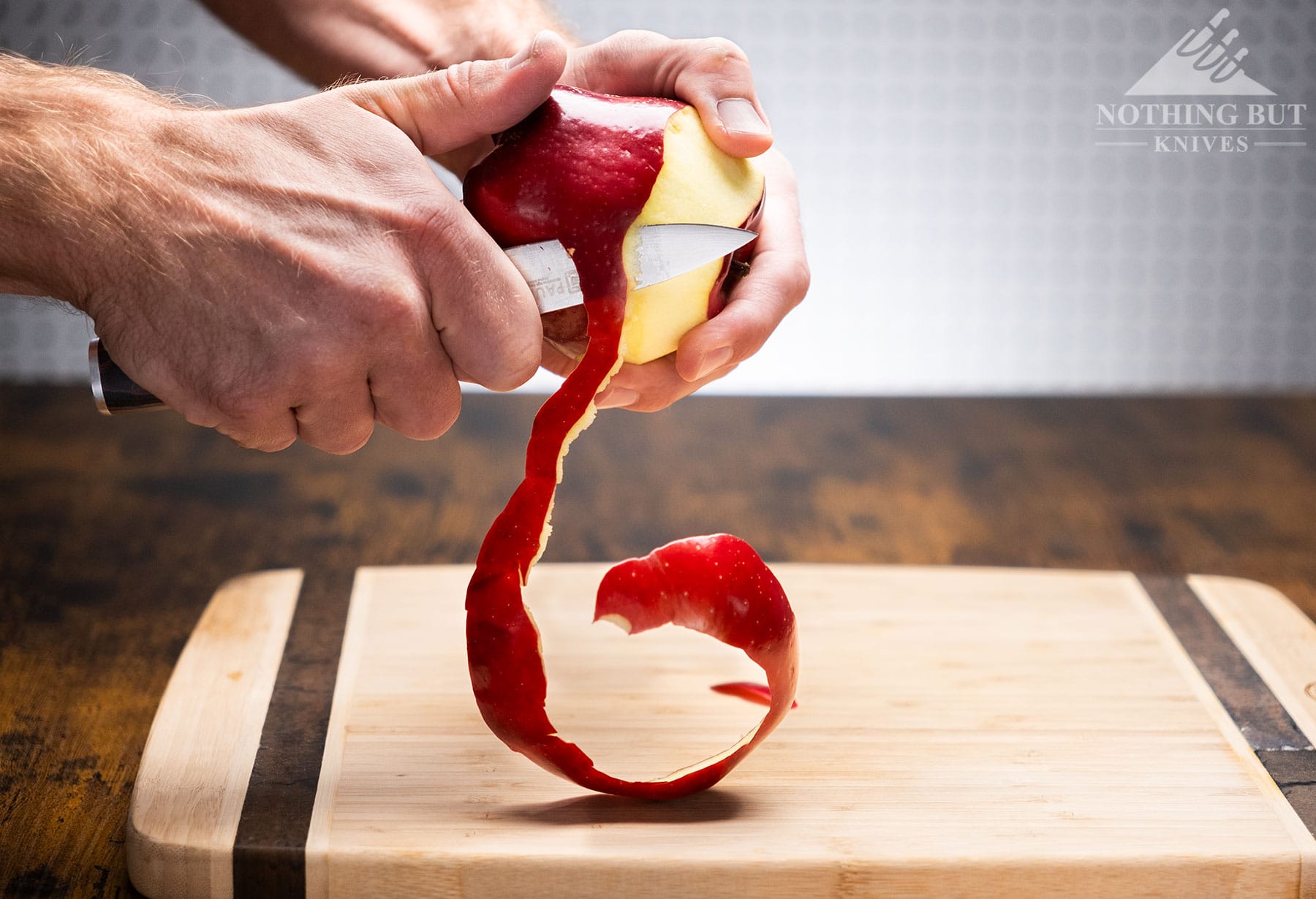
The overall comfort and cutting ability of the paring knife is good. It’s a fine slicer, and the round handle is neutral enough to work well in a traditional grip.
But the paring knife exhibited the worst case of “edge beard” in the whole set. There’s almost a full millimeter of material jutting out from the edge at the heel, which is enough to make me start wondering if this was done intentionally as some kind of subtle finger-guard measure.
Steak Knives
The serrations on the steak knives match the bread knife, so they’re actually pretty good. What I really like about these smaller knives, though, is that they let your hand get a full feel for the handle shape, which is pretty agreeable in a full grip.
The Shears
Nice as these shears look with the wood handles and the neat wood button at the pivot point, I don’t like that they can’t be taken apart easily. That’s going to make cleaning down the road tricky.
Comparison and Alternatives
If you want to stay within the budget category, the other choice is Imarku. Their set is similar enough that I’m inclined to guess they’re made in the same factory, but I prefer the chef’s knife and shears in the Imarku set over the Paudin.
If you want something like this but premium, check out the Shun Premiere series. You’re looking at a steep climb in price, but this is more or less what Paudin is trying to emulate with their set.
If staring into the maw of a Shun price tag has scared you back into the budget category, the Bavarian Knife Works Dreamcut set is a surprisingly high-performing bunch of knives just with a more German-knife approach.
Check out our article on the Best Knife Sets under $200 for more options.
Good Enough for Good Looks and a Quick Jaunt
The question is really how long do you use your knives any given day. Some people just need a quick cut, chop a single onion and you’re done. If that’s the case, this set is fine.
Every knife in this set is light and pretty comfortable, except for the harsh spines. The blades are thin, but the geometry is weird so the cuts feel awkward on thicker foods like potatoes and onions.
I wouldn’t want to use most of these knives as workhorses, but the set looks nice and it’s good in small doses.
